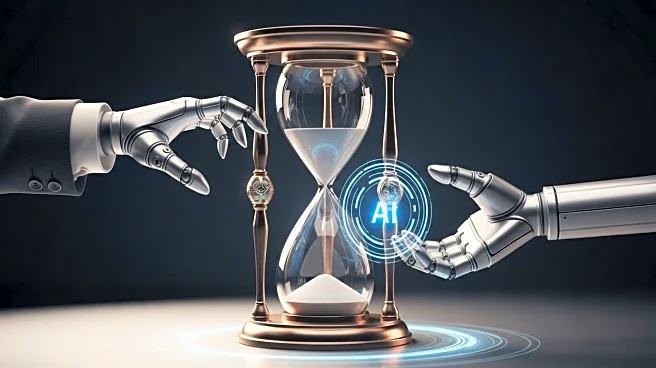What is the story about?
What's Happening?
The U.S. job market is experiencing a significant contraction, with recent data showing a loss of 32,000 jobs in the private sector and a slowdown in job growth. According to Cali Yost, a future-of-work expert, the workforce is on the brink of a major contraction due to the retirement of Gen Xers and a lack of sufficient replacements from younger generations. This demographic shift is compounded by the integration of artificial intelligence, which is expected to create new job opportunities but also increase the demand for a shrinking pool of workers. Yost emphasizes the need for companies to adapt by reconfiguring benefits and creating environments that attract and retain talent.
Why It's Important?
The contraction of the workforce poses significant challenges for U.S. industries and the economy. As the labor pool shrinks, companies may struggle to fill positions, potentially hindering growth and innovation. The integration of AI presents both opportunities and challenges, as it could lead to job creation but also requires a workforce with new skills. Businesses that fail to adapt may face difficulties in maintaining competitiveness. The situation underscores the importance of strategic workforce planning and the need for policies that support workforce development and education to meet future demands.
What's Next?
Companies are encouraged to develop strategies to attract and retain talent, focusing on flexibility, competitive pay, and professional development. Policymakers may need to consider initiatives that support workforce training and education to prepare for the evolving job market. The potential for a contracting workforce could also prompt discussions on immigration policies to address labor shortages. As AI continues to influence the job market, there may be increased emphasis on reskilling and upskilling programs to ensure workers can adapt to new roles.
Beyond the Headlines
The demographic and technological shifts in the workforce raise questions about the future of work and the role of human labor in an increasingly automated world. Ethical considerations around AI integration, such as job displacement and data privacy, may become more prominent. The changing workforce dynamics could also influence cultural attitudes towards work-life balance and the value of traditional employment structures.















